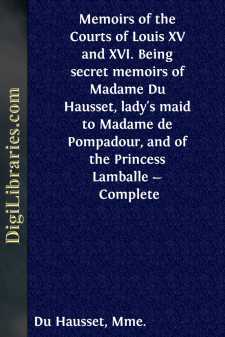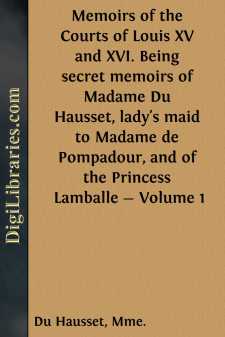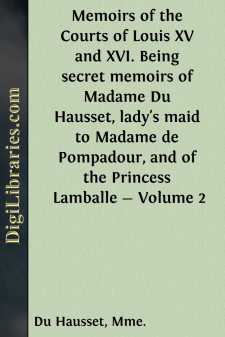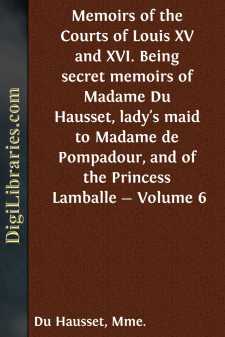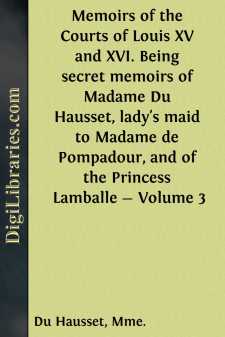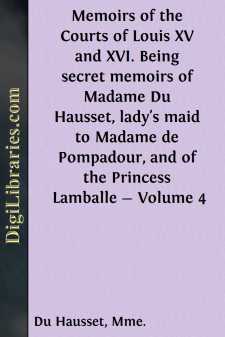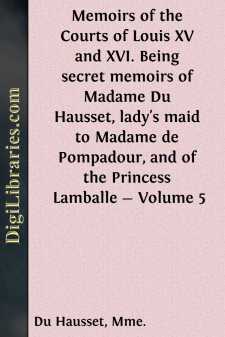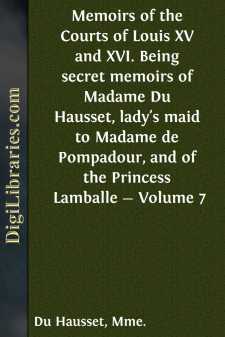Categories
- Antiques & Collectibles 13
- Architecture 36
- Art 48
- Bibles 22
- Biography & Autobiography 813
- Body, Mind & Spirit 142
- Business & Economics 28
- Children's Books 15
- Children's Fiction 12
- Computers 4
- Cooking 94
- Crafts & Hobbies 4
- Drama 346
- Education 46
- Family & Relationships 57
- Fiction 11828
- Games 19
- Gardening 17
- Health & Fitness 34
- History 1377
- House & Home 1
- Humor 147
- Juvenile Fiction 1873
- Juvenile Nonfiction 202
- Language Arts & Disciplines 88
- Law 16
- Literary Collections 686
- Literary Criticism 179
- Mathematics 13
- Medical 41
- Music 40
- Nature 179
- Non-Classifiable 1768
- Performing Arts 7
- Periodicals 1453
- Philosophy 64
- Photography 2
- Poetry 896
- Political Science 203
- Psychology 42
- Reference 154
- Religion 513
- Science 126
- Self-Help 84
- Social Science 81
- Sports & Recreation 34
- Study Aids 3
- Technology & Engineering 59
- Transportation 23
- Travel 463
- True Crime 29
Memoirs of the Courts of Louis XV and XVI. Being secret memoirs of Madame Du Hausset, lady's maid to Madame de Pompadour, and of the Princess Lamballe - Complete
by: Mme. Du Hausset
Categories:
Description:
Excerpt
We were obliged by circumstances, at one time, to read all the published memoirs relative to the reign of Louis XV., and had the opportunity of reading many others which may not see the light for a long time yet to come, as their publication at present would materially militate against the interest of the descendants of the writers; and we have no hesitation in saying that the Memoirs of Madame du Hausset are the only perfectly sincere ones amongst all those we know. Sometimes, Madame du Hausset mistakes, through ignorance, but never does she wilfully mislead, like Madame Campan, nor keep back a secret, like Madame Roland, and MM. Bezenval and Ferreires; nor is she ever betrayed by her vanity to invent, like the Due de Lauzun, MM. Talleyrand, Bertrand de Moleville, Marmontel, Madame d'Epinay, etc. When Madame du Hausset is found in contradiction with other memoirs of the same period, we should never hesitate to give her account the preference. Whoever is desirous of accurately knowing the reign of Louis XV. should run over the very wretched history of Lacretelle, merely for the dates, and afterwards read the two hundred pages of the naive du Hausset, who, in every half page, overturns half a dozen misstatements of this hollow rhetorician. Madame du Hausset was often separated from the little and obscure chamber in the Palace of Versailles, where resided the supreme power, only by a slight door or curtain, which permitted her to hear all that was said there. She had for a 'cher ami' the greatest practical philosopher of that period, Dr. Quesnay, the founder of political economy. He was physician to Madame de Pompadour, and one of the sincerest and most single-hearted of men probably in Paris at the time. He explained to Madame du Hausset many things that, but for his assistance, she would have witnessed without understanding.
INTRODUCTION.
A friend of M. de Marigny (the brother of Madame de Pompadour) called on him one day and found him burning papers. Taking up a large packet which he was going to throw into the fire "This," said he, "is the journal of a waiting-woman of my sister's. She was a very estimable person, but it is all gossip; to the fire with it!" He stopped, and added, "Don't you think I am a little like the curate and the barber burning Don Quixote's romances?"—"I beg for mercy on this," said his friend. "I am fond of anecdotes, and I shall be sure to find some here which will interest me." "Take it, then," said M. de Marigny, and gave it him.
The handwriting and the spelling of this journal are very bad. It abounds in tautology and repetitions. Facts are sometimes inverted in the order of time; but to remedy all these defects it would have been necessary to recast the whole, which would have completely changed the character of the work. The spelling and punctuation were, however, corrected in the original, and some explanatory notes added.
Madame de Pompadour had two waiting-women of good family. The one, Madame du Hausset, who did not change her name; and another, who assumed a name, and did not publicly announce her quality. This journal is evidently the production of the former.
The amours of Louis XV. were, for a long time, covered with the veil of mystery. The public talked of the Parc-aux-Cerfs, but were acquainted with none of its details. Louis XIV., who, in the early part of his reign, had endeavoured to conceal his attachments, towards the close of it gave them a publicity which in one way increased the scandal; but his mistresses were all women of quality, entitled by their birth to be received at Court. Nothing can better describe the spirit of the time and the character of the Monarch than these words of Madame de Montespan:
"He does not love me," said she, "but he thinks he owes it to his subjects and to his own greatness to have the most beautiful woman in his kingdom as his mistress."
An early friend of mine, who married well at Paris, and who has the reputation of being a very clever woman, has often asked me to write down what daily passed under my notice; to please her, I made little notes, of three or four lines each, to recall to my memory the most singular or interesting facts; as, for instance—attempt to assassinate the King; he orders Madame de Pompadour to leave the Court; M. de Machaudt's ingratitude, etc.—I always promised my friend that I would, some time or other, reduce all these materials into the form of a regular narrative. She mentioned the "Recollections of Madame de Caylus," which were, however, not then printed; and pressed me so much to produce a similar work, that I have taken advantage of a few leisure moments to write this, which I intend to give her, in order that she may arrange it and correct the style. I was for a long time about the person of Madame de Pompadour, and my birth procured for me respectful treatment from herself, and from some distinguished persons who conceived a regard for me....


